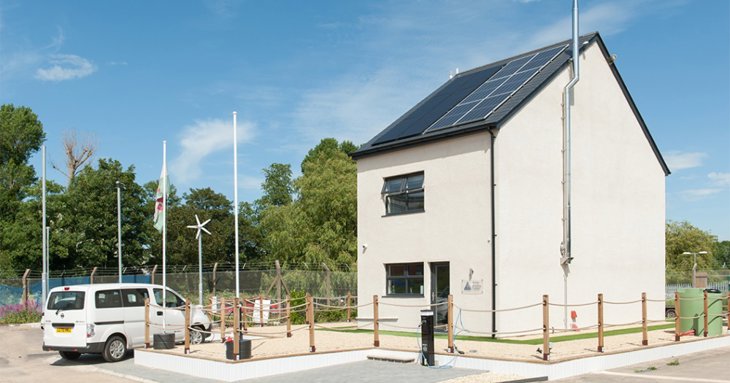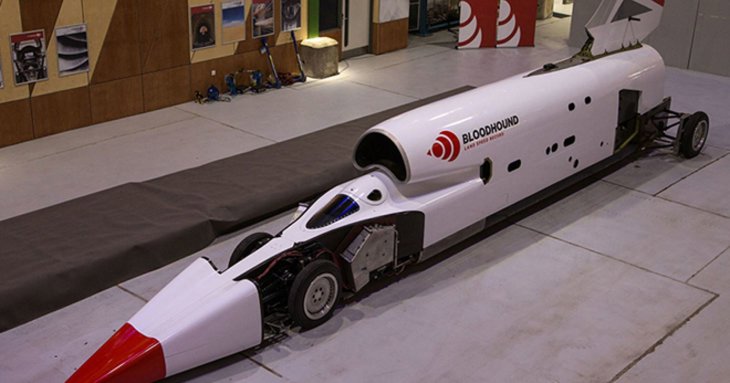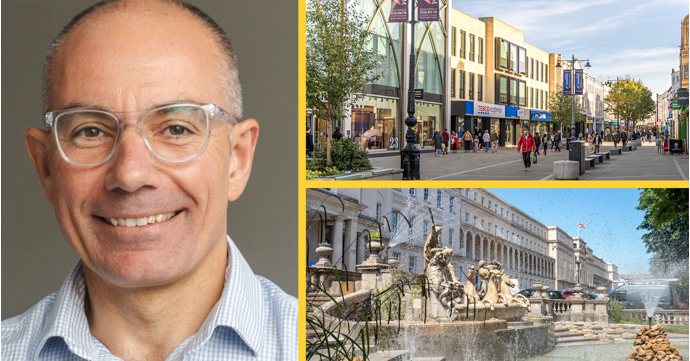Across the many sectors that make Gloucestershire's economy such a success – from cyber to insurance, legal to construction, engineering and manufacturing to agriculture, media to financial services, hospitality to tourism – science and technology are significant common drivers.
Who better for SoGlos to team up with to shine the spotlight on some of the businesses who put science and technology at the core of what they do than GSTP at Berkeley Green, the 300,000 square feet of commercial floor space that is Gloucestershire Science and Technology Park.
Reaching for the skies
What better place to start than aerospace and engineering, a sector that has been at the heart of Gloucestershire since the beginning of the jet age and continues to use science and technology to push the boundaries. And in that sector, few are bigger and more impressive than GE Aviation Systems, a firm committed to becoming carbon neutral across its global operations by 2030..
The American giant’s Gloucestershire footprint is at Bishop’s Cleeve and the firm is a world-leader in the manufacture of jet engines, components and integrated systems for commercial and military aircraft world wide, engines which are 40 per cent more fuel efficient that their 1970s forerunners.
Where food and science are both key ingredients
The picturesque Cotswolds might be famed for its golden stone, green fields and hills of rolling beauty, but between those folds are tucked some incredible businesses – not least Campden BRI, a firm which also helps the more than 1,800 UK firms obligated to report their annual carbon footprint to better understand and manage their impact.
When companies and government for that matter, want to know anything and everything about food – from developing new products, understanding taste, texture, component ingredients, to investigating its origins – they turn to this incredible firm scientists. At last count it was working with 2,900 businesses and turned over more than £21 million.
Future farming
Jones Food Company isn’t the first business to take this idea forward, but when it announced its plans for a ‘vertical farm’ in the Forest of Dean in was unveiling plans for a 148,000 square feet business it predicts will be able to supply 1,000 tonnes plus of fresh produce to thousands of UK supermarkets’.
The business already operates Europe’s largest vertical farm near Scunthorpe, but when it opens its new Gloucestershire operation shortly it claims it will be the world’s biggest venture of its kind, able support 70 per cent of the UK’s fresh produce within the next 10 years.
An incubator for clever new ideas
Hartpury University and Hartpury College is not content with
being rated among the very best for teaching and winning high praise from
Ofsted, it is determined to get close to and support businesses, not least through
its business incubator Tech Box Park.
YAGRO, one of the tenants in the business park, is described as ‘a team of entrepreneurs, and technologists, passionate about making farming businesses healthier and more economically sustainable for the next generation. Products include real-time intelligent tracking of crop performance software and management tools and ‘on-farm’ data-driven insight to improve productivity. Just one of the businesses Hartpury is helping support.
Farming shrimps for our restaurants
Still in the world of agriculture, although perhaps not as we usually know it. The Royal Agricultural University’s Farm 491 was set up to encourage innovative ideas that could benefit the sector – and plugging into its expertise is the fledging firm Land Ocean Farm.
The business is the brain child of two Cheltenham entrepreneurs and restauranteurs, Litu Mohiuddin and Rasel Mahmud, who hope to use a mixture of science and technology to make on-shore shrimp farming possible and give it access to a British market worth an estimated £500 million and reduce food miles for customers.
Fuel that is green
A pioneer in renewable fuels, Green Fuels Research, based at Gloucestershire Science and Technology Park at Berkeley Green, is a family business that continues to push the boundaries of just what fuel can propel the engines that help drive our world.
Founded in 2003 the firm has supplied biofuel equipment with a total capacity of more than 420 million litres a year to customers in more than 80 countries and its researchers are working on projects ranging from fish-farming to jet fuel.
The heart of the medical technology
Not the only Gloucestershire firm at the forefront of some incredible medical related breakthroughs, but one more than worthy of special mention – Livanova UK is based on Gloucestershire Business Park.
The firm, which has also declared a continuous commitment in reducing its carbon footprint, specialises in the development of medical technologies for cardiac surgery and innovative therapies for cardiac rhythm dysfunction and interventional cardiology.
Supporting scientists across the globe
Sartorius is helping biotech scientists and engineers across the entire globe to develop and manufacture medications from the first idea to production to help more people gain access to better medicines to tackle diseases including cancer, dementia or inflammatory diseases, are still incurable. It also supports work in food and beverage testing laboratories.
Chris Biddell started the business in his uncle's garage in Oakridge more than 30 years ago and today the firm is described as ‘one of the fastest-growing global life science companies’, employing 240 staff at its Stonehouse base. Its environmental policy is binding on all companies in its group.
Helping develop green buildings for the future

Clients including housing associations, government agencies, architects and construction firms seeking to decarbonise and deploy new technologies and make its buildings more environmentally friendly and efficient use the services of the Active Building Centre (ABC).
Based at the Gloucestershire Science and Technology Park at Berkeley Green the business provides independent and impartial advice advise on ‘active building’ and how best buildings can generate, efficiently manage, store, share and pass energy that is unused back into the grid. ABC was created in 2019 as part of the UK Government’s Transforming Construction challenge.




.jpg?width=690&height=361&rmode=pad&bgcolor=ffffff&quality=85)














